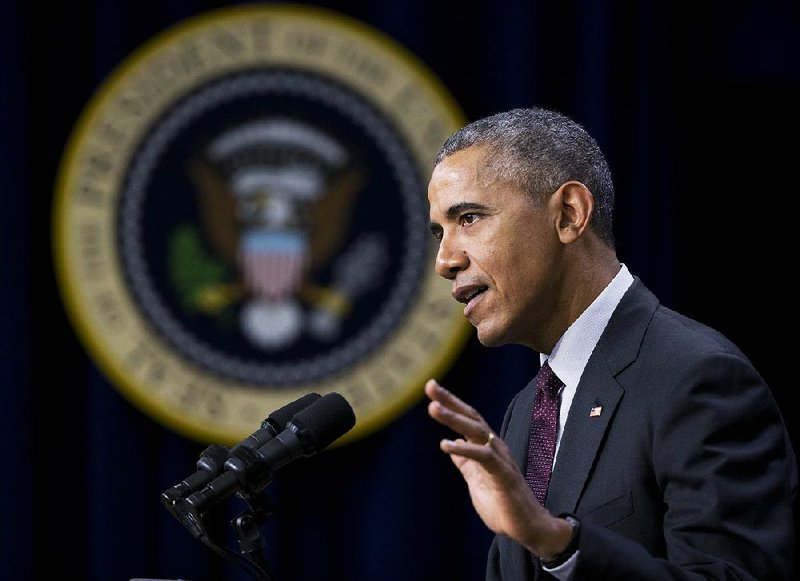WASHINGTON -- President Barack Obama sought to showcase progress during his administration on closing the pay gap for women while keeping up the pressure on businesses, Congress and individuals to tackle an issue he said was still far from being solved.
Marking the seventh anniversary of signing the Lilly Ledbetter Fair Pay Act, Obama said more must be done to get women into high-paying jobs, including those in science, technology, math and engineering. In recent years, the pay disparity has narrowed slightly, but a woman in the U.S. still makes 79 cents to a man's dollar, the White House said.
"This will be a long haul," Obama said.
Working to ferret out abuses of equal-pay laws, Obama announced that his administration will expand its collection of data from businesses about what they pay.
In 2014, Obama directed the Labor Department to collect data from federal contractors about what they pay employees, sorted by gender, race and ethnicity. The revised proposal will cover all businesses with 100 or more employees, regardless of whether they contract with the government.
The Equal Employment Opportunity Commission will collect the data, which the government will use to help identify companies that should be investigated for failing to pay workers fairly, officials said. The first reports from companies will be due in September 2017. The administration estimated that compliance will cost less than $400 per employer the first year and a few hundred dollars per year after that.
The new policy, already drawing criticism from some business leaders, would order companies to add salary numbers on a form they already submit annually that reports employee sex, age and job groups.
"Oftentimes, folks are doing the same job and being paid differently," Obama said in a speech at the White House. "The goal is to help businesses who are trying to do the right thing get a clearer picture of how they can ensure their employees are being treated fairly."
During the updated data-collection process, officials would not publicly name employers or employees, said Jenny Yang, chairman of the commission, which published the proposed rule with the Department of Labor. If the agency files a discrimination lawsuit as a result of the findings, however, companies would appear in public record.
The agency also intends to turn the aggregated data into an annual salary report, showing the average pay for workers in different sectors and industries across the country, starting next year. The information, Yang said, would help managers assess how they set pay and inform employees during the negotiation process. If the new policy is approved by the Office of Management and Budget and enacted by its September deadline, the first report would be published a year later.
"Pay discrimination goes undetected because of a lack of accurate information about what people are paid," Yang said at the White House conference. "Collecting this pay data would help fill a critical void we need to ensure American workers receive fair pay for their work."
Detractors say the policy change would create an unnecessary government overreach. Roughly 67,000 employers would have to take on the extra paperwork.
Randy Johnson, senior vice president of Labor, Immigration, and Employee Benefits for the U.S. Chamber of Commerce, said that, though the organization supports equal pay for equal work, the new rule would place an unnecessary burden on employers while providing no "meaningful insight."
David Cohen, president of DCI Consulting Group, a consulting firm that leads businesses' pay-equity studies, said the proposal is undermined because it will compare pay of workers with vastly different jobs, markets and abilities. The summarized data will be reported across 10 broad job categories -- "professionals," for instance, range from doctors and nuclear engineers to social workers -- that could muddle the results.
Civil-rights attorney Debbie Katz said the new rule would be more than a symbolic call for wage equality. Workers who take their discrimination cases to the EEOC, she said, would have objective numbers to back them up.
The president also reissued his call to Congress to pass further legislation giving more tools to women to fight pay disparities. Republicans have been skeptical about the legislation out of concern it could encourage frivolous lawsuits, and some Republicans criticized Obama on Friday for sidestepping Congress with the data-collection effort.
"The way to make meaningful, lasting progress on equal pay for women isn't unilateral presidential action," said Sen. Deb Fischer, R-Neb.
Ledbetter, whose name has become synonymous with the equal pay issue, flanked Obama at the White House and said she still hears every day from women who are "frustrated and angry" about being paid less. Ledbetter's discovery that she was being paid less than her male counterparts led to a Supreme Court suit and eventually the 2009 legislation bearing her name.
"It hurts us, it hurts our families and it hurts our economy," Ledbetter said.
Information for this article was contributed by Josh Lederman of The Associated Press and by David Nakamura of The Washington Post.
A Section on 01/30/2016

